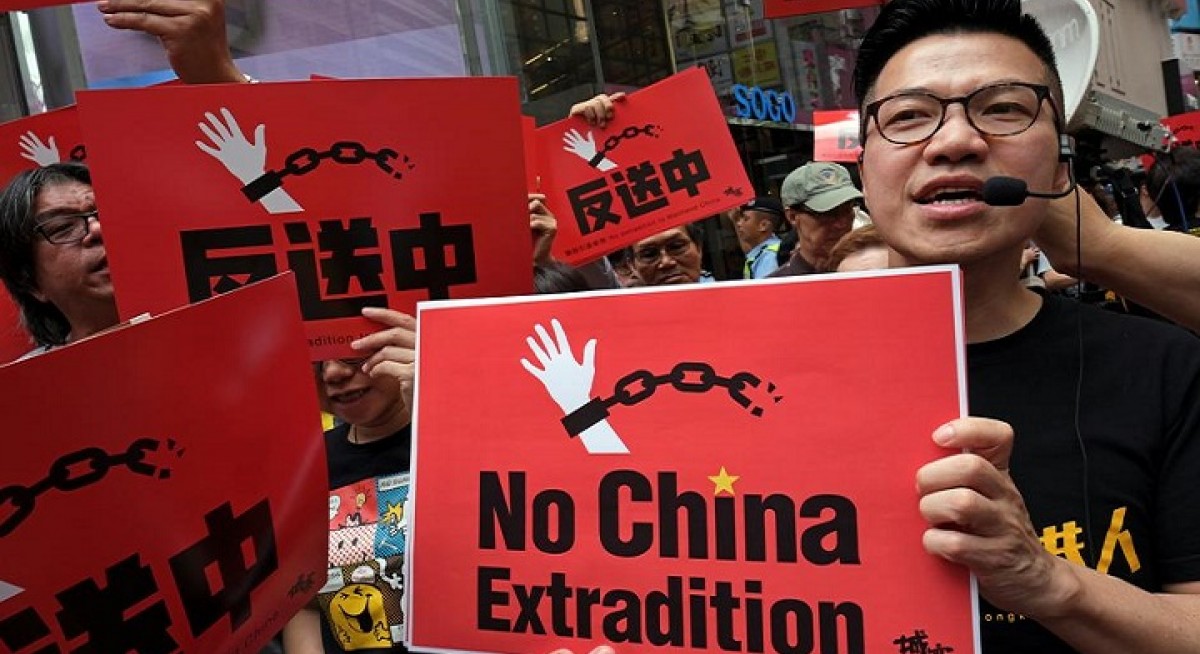“I don’t think it is (an) appropriate decision for us now to pull out of this bill because of the very important objectives that this bill is intended to achieve,” a somber Lam told reporters while flanked by security and justice chiefs.
“While we will continue to do the communication and explanation, there is very little merit to be gained to delay the bill. It will just cause more anxiety and divisiveness in society.”
The protests plunged Hong Kong into political crisis, just as months of pro-democracy “Occupy” demonstrations did in 2014, heaping pressure on Lam’s administration and her official backers in Beijing. Chants echoed through city streets on Sunday calling on her to quit. “Extradite yourself, Carrie!” one placard read.
The rendition bill has generated unusually broad opposition, from normally pro-establishment business people and lawyers to students, pro-democracy figures and religious groups fearing the further erosion of Hong Kong’s legal autonomy and the difficulty of ensuring even basic judicial protections in mainland China.
US State Department spokeswoman Morgan Ortagus said on Monday that Washington was gravely concerned about the proposed amendments and warned that “continued erosion of the ‘one country, two systems’ framework puts at risk Hong Kong’s long-established special status in international affairs.”
She said the United States was concerned the amendments could damage Hong Kong’s business environment “and subject our citizens residing in or visiting Hong Kong to China’s capricious judicial system.”
Any amendments “should be pursued with great care and in full consultation with a broad range of local and international stakeholders who may be affected,” she said.
A 1992 US law recognises Hong Kong’s special status and allows the United States to engage with it as a non-sovereign entity distinct from China in matters of trade and economics. Areas of special treatment include visas, law enforcement, including extraditions, and investment.
A US congressional commission said in a report last month that amending the extradition laws could provide grounds for Washington to re-examine elements of its relationship with Hong Kong outlined in the 1992 law.
Britain handed Hong Kong back to China under a “one-country, two-systems” formula, with guarantees that its autonomy and freedoms, including an independent justice system, would be protected.
But many accuse China of extensive meddling in many sectors, denying democratic reforms and squeezing freedoms, interfering with local elections and the disappearance of five Hong Kong-based booksellers, starting in 2015, who specialised in works critical of Chinese leaders. All later appeared in detention in China, and some appeared in apparent forced confessions broadcast in Hong Kong.
Chinese Foreign Ministry spokesman Geng Shuang told a daily news briefing that Beijing would continue to support the extradition bill.
“We resolutely oppose wrong words and actions by any foreign forces to interfere in the legislative matters of the Hong Kong SAR,” he said, referring to the “special administrative region”.
An official newspaper in China, where the Communist Party holds sway over the courts, said: “Some Hong Kong residents have been hoodwinked by the opposition camp and their foreign allies into supporting the anti-extradition campaign”.
The proposed changes provide for case-by-case extraditions to jurisdictions, including mainland China, beyond the 20 states with which Hong Kong already has treaties.
It gives the chief executive power to approve an extradition after it has been cleared by Hong Kong’s courts and appeal system.
Additional amendments
Lam said last month that after feedback from business and other groups, only suspects facing more serious crimes, or those normally dealt with by Hong Kong’s High Court, with a minimum punishment of at least seven years, rather than the three years, would be extradited.
She said that extradition requests from China could only come from its highest judicial body, the Supreme People’s Procuratorate, rather than any provincial authorities.
Lam sought to soothe public concerns and said her administration was creating additional amendments to the bill, including safeguarding human rights.
“This bill is not about the mainland alone. This bill is not initiated by the central people’s government. I have not received any instruction or mandate from Beijing to do this bill,” she told reporters.
She said the bill would be put for debate on Wednesday as planned in the city’s 70-seat Legislative Council, which is now controlled by a pro-Beijing majority.
Lam and her officials stress the need for haste to prosecute a young Hong Kong man suspected of killing his girlfriend in Taiwan. But Taiwanese officials say they will not agree to any transfer if the bill goes ahead, citing rights concerns.
In Taiwan, which China regards as a breakaway province, President Tsai Ing-wen said on her Facebook page: “We support the people of Hong Kong’s search for freedom, democracy and human rights.”
Beijing officials have increasingly defended Lam’s plan, couching it as a sovereignty issue. A retired senior mainland security official said in March that Beijing already had a list of 300 mainland criminals it wanted back from Hong Kong.
Organisers put the size of Sunday’s crowd at more than a million, outstripping a demonstration in 2003 when 500,000 took to the streets to challenge government plans for tighter national security laws.
Police put the figure at 240,000 at the march’s peak.



